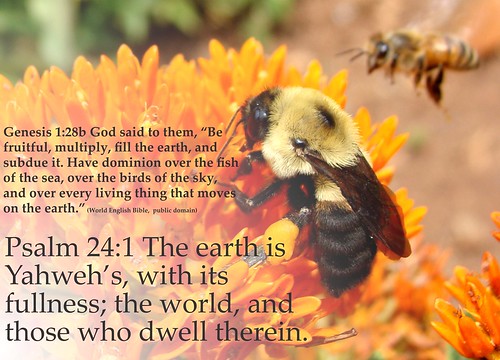I am musing, or quoting what others have mused, about what the Bible means when it says that man was created in the
image of God. In an
earlier post, I gave one theologian's interpretation, and quoted all the scripture that seems even close to relevant. I also gave John Calvin unduly short shrift on the matter. In this post, I attempt to rectify that by quoting what John Calvin said in his commentary about what I take to be the most important passage on the subject, namely Genesis 1:27, and its context. It is my understanding that this material is public domain, so I am quoting at length. I thank those who have placed this material on the Internet for public use.
from John Calvin's Bible Commentary
Verse 26. Let us make man . 49 Although the tense here used is the future, all must acknowledge that this is the language of one apparently deliberating. Hitherto God has been introduced simply as commanding; now, when he approaches the most excellent of all his works, he enters into consultation. God certainly might here command by his bare word what he wished to be done: but he chose to give this tribute to the excellency of man, that he would, in a manner, enter into consultation concerning his creation. This is the highest honor with which he has dignified us; to a due regard for which, Moses, by this mode of speaking would excite our minds. For God is not now first beginning to consider what form he will give to man, and with what endowments it would be fitting to adorn him, nor is he pausing as over a work of difficulty: but, just as we have before observed, that the creation of the world was distributed over six days, for our sake, to the end that our minds might the more easily be retained in the meditation of God's works: so now, for the purpose of commending to our attention the dignity of our nature, he, in taking counsel concerning the creation of man, testifies that he is about to undertake something great and wonderful. Truly there are many things in this corrupted nature which may induce contempt; but if you rightly weigh all circumstances, man is, among other creatures a certain preeminent specimen of Divine wisdom, justice, and goodness, so that he is deservedly called by the ancients mikri>kosmov, "a world in miniature." But since the Lord needs no other counsellor, there can be no doubt that he consulted with himself. The Jews make themselves altogether ridiculous, in pretending that God held communication with the earth or with angels. 50 The earth, forsooth, was a most excellent adviser! And to ascribe the least portion of a work so exquisite to angels, is a sacrilege to be held in abhorrence. Where, indeed, will they find that we were created after the image of the earth, or of angels? Does not Moses directly exclude all creatures in express terms, when he declares that Adam was created after the image of God? Others who deem themselves more acute, but are doubly infatuated, say that God spoke of himself in the plural number, according to the custom of princes. As if, in truth, that barbarous style of speaking, which has grown into use within a few past centuries, had, even then, prevailed in the world. But it is well that their canine wickedness has been joined with a stupidity so great, that they betray their folly to children. Christians, therefore, properly contend, from this testimony, that there exists a plurality of Persons in the Godhead. God summons no foreign counsellor; hence we infer that he finds within himself something distinct; as, in truth, his eternal wisdom and power reside within him. 51
In our image, etc . Interpreters do not agree concerning the meaning of these words. The greater part, and nearly all, conceive that the word image is to be distinguished from likeness. And the common distinction is, that image exists in the substance, likeness in the accidents of anything. They who would define the subject briefly, say that in the image are contained those endowments which God has conferred on human nature at large, while they expound likeness to mean gratuitous gifts. 52 But Augustine, beyond all others, speculates with excessive refinement, for the purpose of fabricating a Trinity in man. For in laying hold of the three faculties of the soul enumerated by Aristotle, the intellect, the memory, and the will, he afterwards out of one Trinity derives many. If any reader, having leisure, wishes to enjoy such speculations, let him read the tenth and fourteenth books on the Trinity, also the eleventh book of the "City of God." I acknowledge, indeed, that there is something in man which refers to the Fathers and the Son, and the Spirit: and I have no difficulty in admitting the above distinction of the faculties of the soul: although the simpler division into two parts, which is more used in Scripture, is better adapted to the sound doctrine of piety; but a definition of the image of God ought to rest on a firmer basis than such subtleties. As for myself, before I define the image of God, I would deny that it differs from his likeness. For when Moses afterwards repeats the same things he passes over the likeness, and contents himself with mentioning the image. Should any one take the exception, that he was merely studying brevity; I answer, 53 that where he twice uses the word image, he makes no mention of the likeness. We also know that it was customary with the Hebrews to repeat the same thing in different words. besides, the phrase itself shows that the second term was added for the sake of explanation, 'Let us make,' he says, 'man in our image, according to our likeness,' that is, that he may be like God, or may represent the image of God. Lastly, in the fifth chapter, without making any mention of image, he puts likeness in its place, (Genesis 5:1.) Although we have set aside all difference between the two words we have not yet ascertained what this image or likeness is. The Anthropomorphites were too gross in seeking this resemblance in the human body; let that reverie therefore remain entombed. Others proceed with a little more subtlety, who, though they do not imagine God to be corporeal, yet maintain that the image of God is in the body of man, because his admirable workmanship there shines brightly; but this opinion, as we shall see, is by no means consonant with Scripture. The exposition of Chrysostom is not more correct, who refers to the dominion which was given to man in order that he might, in a certain sense, act as God's vicegerent in the government of the world. This truly is some portion, though very small, of the image of God. Since the image of God had been destroyed in us by the fall, we may judge from its restoration what it originally had been. Paul says that we are transformed into the image of God by the gospel. And, according to him, spiritual regeneration is nothing else than the restoration of the same image. (Colossians 3:10, and Ephesians 4:23.) That he made this image to consist in righteousness and true holiness, is by the figure synecdochee; 54 for though this is the chief part, it is not the whole of God's image. Therefore by this word the perfection of our whole nature is designated, as it appeared when Adam was endued with a right judgment, had affections in harmony with reason, had all his senses sound and well-regulated, and truly excelled in everything good. Thus the chief seat of the Divine image was in his mind and heart, where it was eminent: yet was there no part of him in which some scintillations of it did not shine forth. For there was an attempering in the several parts of the soul, which corresponded with their various offices. 55 In the mind perfect intelligence flourished and reigned, uprightness attended as its companion, and all the senses were prepared and moulded for due obedience to reason; and in the body there was a suitable correspondence with this internal order. But now, although some obscure lineaments of that image are found remaining in us; yet are they so vitiated and maimed, that they may truly be said to be destroyed. For besides the deformity which everywhere appears unsightly, this evil also is added, that no part is free from the infection of sin.
In our image, after our likeness . I do not scrupulously insist upon the particles b, (beth,) and k, (caph. 56) I know not whether there is anything solid in the opinion of some who hold that this is said, because the image of God was only shadowed forth in man till he should arrive at his perfection. The thing indeed is true; but I do not think that anything of the kind entered the mind of Moses. 57 It is also truly said that Christ is the only image of the Fathers but yet the words of Moses do not bear the interpretation that "in the image" means "in Christ." It may also be added, that even man, though in a different respects is called the image of God. In which thing some of the Fathers are deceived who thought that they could defeat the Asians with this weapon that Christ alone is God's, image. This further difficulty is also to be encountered, namely, why Paul should deny the woman to be the image of God, when Moses honors both, indiscriminately, with this title. The solution is short; Paul there alludes only to the domestic relation. He therefore restricts the image of God to government, in which the man has superiority over the wife and certainly he meant nothing more than that man is superior in the degree of honor. But here the question is respecting that glory of God which peculiarly shines forth in human nature, where the mind, the will, and all the senses, represent the Divine order.
And let them have dominion . 58 Here he commemorates that part of dignity with which he decreed to honor man, namely, that he should have authority over all living creatures. He appointed man, it is true, lord of the world; but he expressly subjects the animals to him, because they having an inclination or instinct of their own, 59 seem to be less under authority from without. The use of the plural number intimates that this authority was not given to Adam only, but to all his posterity as well as to him. And hence we infer what was the end for which all things were created; namely, that none of the conveniences and necessaries of life might be wanting to men. In the very order of the creation the paternal solicitude of God for man is conspicuous, because he furnished the world with all things needful, and even with an immense profusion of wealth, before he formed man. Thus man was rich before he was born. But if God had such care for us before we existed, he will by no means leave us destitute of food and of other necessaries of life, now that we are placed in the world. Yet, that he often keeps his hand as if closed is to be imputed to our sins.
Verse 27. So God created man . The reiterated mention of the image of God is not a vain repetition. For it is a remarkable instance of the Divine goodness which can never be sufficiently proclaimed. And, at the same time, he admonishes us from what excellence we have fallen, that he may excite in us the desire of its recovery. When he soon afterwards adds, that God created them male and female, he commends to us that conjugal bond by which the society of mankind is cherished. For this form of speaking, God created man, male and female created he them, is of the same force as if he had said, that the man himself was incomplete. 60 Under these circumstances, the woman was added to him as a companion that they both might be one, as he more clearly expresses it in the second chapter. Malachi also means the same thing when he relates, (Genesis 2:15,) that one man was created by God, whilst, nevertheless, he possessed the fullness of the Spirit. 61 For he there treats of conjugal fidelity, which the Jews were violating by their polygamy. For the purpose of correcting this fault, he calls that pair, consisting of man and woman, which God in the beginning had joined together, one man, in order that every one might learn to be content with his own wife.
In my next two posts on this subject, I expect to do the same for John Wesley and Matthew Henry that I did for Calvin in this post, then, after that, follow up with the views of some 20th and 21st century theologians on this matter, and attempt to make some sense out of what all of them have said, and indicate my own view on the matter.
Thanks for reading.
* * * * *
Later posts quote
John Wesley and
Matthew Henry.







